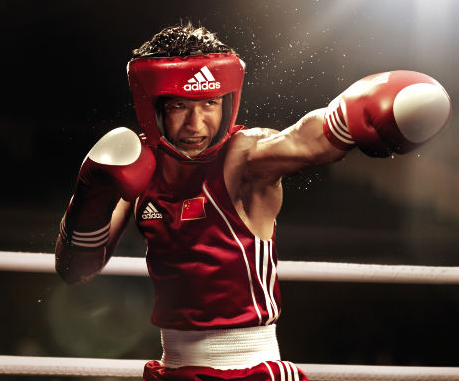(单词翻译:单击)

For Zou Shiming, the trim boxer with a wispy mullet and a quick wit, 2008 has come to define his life. "It's my lucky number," he explains, referring to the year in which he won China's first Olympic boxing gold,as well as to the last four digits of his cellphone and licence plate.
对于身材瘦小、发型流行且思维敏捷的邹市明而言,2008已成为他生命中不可磨灭的印迹。"2008是我的幸运数字,"他解释道,他指的是他赢得中国首枚奥运拳击金牌的那一年,他的手机号和车牌号码的后四位也是2008。
It was a landmark year for many, even those far away from the Olympic podium. Beijing seized on the Games as a chance to present the new face of a modern China, and the world snapped to attention, with dozens of world leaders including the US president attending the elaborate opening ceremonies in the Bird's Nest.
对于很多人而言,那是具有里程碑意义的一年,即便对于那些远离奥运会领奖台的人也是如此。中国以2008年奥运会为契机,展示了一个现代中国的新气象,世界也予以大力关注,包括美国总统在内的多位世界领导人参加了在鸟巢举办的美轮美奂的奥运会开幕式。
For Zou, a light flyweight boxer known for his quick step, the things he remembers are more mundane: how he couldn't sleep the night before his final match as his mind raced through boxing scenarios. How the TV stations that morning kept saying China's gold medal count stood at 49, and that maybe Zou would win number 50. How he took a nap after breakfast.
对于以动作快而闻名的48公斤级拳击运动员邹市明而言,他记得的事情更为平凡:在决赛前的那个晚上,由于他满脑子想的都是各种拳击动作,以至于无法入睡;当天早晨电视台报道称,中国的金牌总数为49枚,邹市明或许会赢得第50枚金牌;早饭后他小睡了一会。
And how utterly disoriented he felt when he won. "When the result was announced I just didn't expect it to be settled in that way," he says. His opponent, a tough Mongolian named Purevdorjiin Serdamba, injured his shoulder and withdrew from the second round of their match, handing Zou the gold. "I had always thought that the final rounds would be close and the fight would be intense. Then all of a sudden I was an Olympic champion," he recalls. "In interviews after the match I was sputtering and could hardly tell which way was up."
他也记得,当他获胜时,他的心绪一片茫然。他说道:"当结果宣布时,我真没想到事情就这样结束了。"他的对手——强悍的蒙古选手普雷夫多吉•塞尔丹巴(Purevdorjiin Serdamba)———因肩伤退出第二个回合比赛,将金牌拱手让给了邹市明。"我还一直以为,最后几个回合双方将势均力敌,我们会激战一场。接着,突然之间,我变成了奥运冠军,"他回忆道,"在赛后接受采访时,我简直语无伦次,辨不清方向。"
Zou had been training for that match for most of his life. Born in the southern province of Guizhou in 1981, Zou grew up just as China was beginning its market reforms, a process that lifted hundreds of millions out of poverty and set the country on course to become the world's second-largest economy.
邹市明生命中的大部分时间都在为了这场比赛而训练。他1981年生于中国南部的贵州省,当时正值中国启动市场改革,这些改革让数亿人脱贫,并让中国走上了成为全球第二大经济体的道路。
In elementary school, Zou was by his own admission a trouble-maker, so his parents transferred him to a sports school. He studied martial arts but grew restless at the "constrained" discipline. "That's just not my style," he says. He soon discovered boxing, but tried to hide it from his parents because they considered it too violent. Steadily he developed his sparring skills under the tutelage of a coach who dubbed young Zou the "pirate" because of his ability to steal a jab at an opponent.
上小学时,邹市明是个淘气鬼(他自己承认的),因此他的父母把他转到了一所体校。他在那里学习武术,但他逐渐对这一"受限"学科感到不满。他说:"这不是我的风格。"他很快发现了拳击,但试图瞒着父母,因为他们认为这种运动过于暴力。在教练的指导下,他逐渐练就了轻拳出击的技巧,由于他擅长偷袭对手,教练给小邹市明起了一个"海盗"的绰号。
In 2004, Zou took the bronze in Athens, marking China's first Olympic boxing medal. Four years later, he was back on the podium leading the boxing team to two golds, a silver and a bronze. Chinese athletes cleaned up that year, taking home more golds than any other country and winning 100 medals overall. The nation's increased focus on sports where the chances of taking gold would be higher, such as women's weightlifting, had paid off.
2004年,邹市明在雅典奥运会上夺得铜牌,这是中国首枚奥运拳击奖牌。4年后,他再次站到领奖台上,率领拳击队夺得两枚金牌、一枚银牌和一枚铜牌。那一年,中国运动员大获全胜,金牌总数超过其它任何一个国家,共赢得100枚奖牌。中国加大对夺金几率较高的体育项目(例如女子举重)的关注,已显出成效。
The sport of boxing, which Mao Zedong once banned for being too western, had never been one at which Chinese athletes excelled - until Zou came along. "I was lucky to compete in my home country and win a gold medal," Zou says simply. "The Olympic Games mark how a country or a city developed."
毛泽东曾因为拳击过于西化而禁止该项目,此前中国运动员从未在这个领域取得过出众表现,直到邹市明的出现。"在我的祖国比赛并赢得金牌,这是我的幸运,"邹市明简单地说道,"奥运会标志着一个国家或一个城市取得了怎样的发展。"
This summer, he'll be training hard for London. But it won't be anything like 2008. "It will be my third Olympics already. I've already lost, and I've already won. This time around it's more about exhibiting myself and encouraging young athletes," he explains. "For me, [winning the gold] was like taking all the pressure off."
今年夏季,他将刻苦训练参加伦敦奥运会。但这次与2008年完全不同。"这将是我第三次参加奥运会。我失败过,也胜利过。这一次,更多的是展示自我,并鼓励年轻队员,"他解释道,"对我来说,(赢得金牌)就像是卸下所有压力。"


